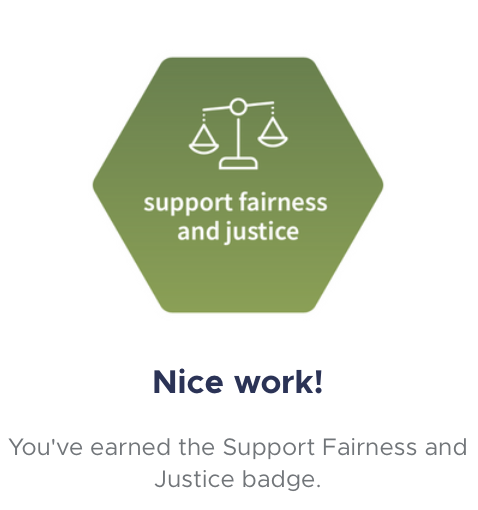I’m taking at my pace the free online course “Foundations of humane technology” by the Center for Humane Technology (whom I had heard of after watching the excellent documentary “The Social Dilemma”.) These are my notes.
- Module 1 – setting the stage
- Module 2 – respecting human nature
- Module 3 – minimizing harmful consequences
- Module 4 – centering values
- Module 5 – creating shared understanding
- Module 6 – supporting fairness & justice
- Module 7 – helping people thrive
- Module 8 – ready to act
Justice is the degree to which citizens can practically experience democratic values such as freedom of speech, due process, voting. A “capability approach”, as described by Professors Martha Nussbaum and Amartya Sen, is enabling the realization or fulfillment of these values. For example, it is physically and socially safe to exercise free speech. Or voting stations are accessible and easy to get to.
Humane Technologist checklist
Accept uncertainty
- Any complex system/tool comes with consequences that are hard to predict, and sometimes hard to understand.
- Acknowledge your limitations with humility.
Anticipate unexpected outcomes
- Acknowledge that harms are complex, shifting, difficult to predict.
- Strive to find and address externalities that deepen inequalities.
Form accountable relationships with users
- Communicate in good faith.
- Seek knowledge in particular about and from groups affected by the technology.
- Create space for listening and mutual understanding.
- Understand how your technology is used.
- Mind that come communities have a greater vulnerability to harm.
- Include the most impacted groups in the design process.
I was very pleased to discover in the list of takeaways and resources that Center for Humane Technology recommend W3C’s free Digital Accessibility Foundations course as a way to create more inclusive digital products and services.
🤔 Personal reflection: Core societal capabilities
What is your vision of a just democracy in the digital age? How have you seen technology enhance and degrade the capabilities of yourself and others?
Just democracy in an era where technology brings together people but also divides them, is one which prioritises common interests over individuals’ and actually allows people to exercise their rights, to make a difference. Ideally, the digital age is harnessed to solve hard problems effectively. I’m seeing at the same time a plethora of ways to express ourselves, but scarcity of actual means to make a difference or not at a pace that is encouraging.
🤔 Personal reflection: Relationships with those impacted
Consider a product you’ve worked on. Ask yourself about the relationships you have with those affected by this technology. (If you don’t work on products, try to put yourself in the shoes of the builders/operators of a technology you regularly use.) Do we hear and respond to those who are directly impacted by our product?
Yes, although it may take several user reports to illustrate a given impact. Sometimes addressing issues can be tabled until other priorities are crossed off, unless the issues warrant being put top of the priority list.
Do those impacted by our product have a way to communicate their experience to decision-makers in our organization?
Yes, our process is pretty open and ways to give feedback prominently displayed.
Are there voices that should be better represented in our design process? Are we uniquely positioned to build trust with groups of people whose perspectives are missing?
Yes. Once input is welcome or sought, and conversation is established, it is up to the stakeholders to inspire or grant trust. Good faith and reasonable due process are key ingredients that enable issues to be triaged or resolutions to be understood.

